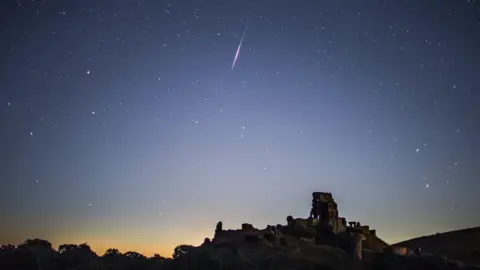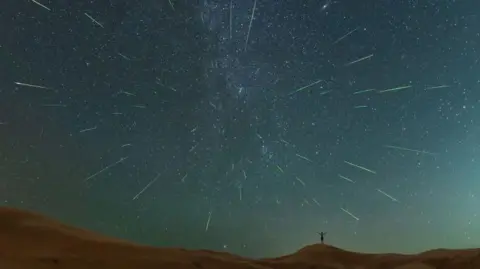 Dan Kidwood/Getty Images
Dan Kidwood/Getty ImagesParts of the UK will be treated to another celestial treat on Monday evening as the Perseid meteor shower continues to hit the skies.
The scene, which started on Sunday night, is expected to continue till Tuesday morning.
Each year the Perseids pass through our atmosphere as Earth orbits through the debris left behind by Comet Swift-Tuttle.
Experts say the best chance of spotting a meteor starts after midnight and ends an hour before sunrise, but it’s worth checking your weather.
According to the Met Office, the viewing conditions will be good at the rate of 100 meteors every hour from Monday night to Tuesday.
The National Weather Service added that coronal mass ejections – bursts of magnetic fields and solar storms from the sun – could provide an improved chance of seeing the northern lights in northern parts of the UK.
What is the Perseid Meteor Shower?
Perseid meteors are found all over the world and are so called because they originate from the Perseus constellation.
While most nights the shower will only show a few meteors every hour, the peak of the Perseids will bring many, many more.
Scientists say that if you’re really lucky, you can see 100 or more meteors per hour.
We see meteors when Earth crosses the paths of comets or asteroid debris. When that debris hits our planet’s atmosphere, it burns up, creating spectacular streaks of light.
The Perseids – pronounced ‘Per-see-ids’ – are caused by debris left by Comet Swift-Tuttle.
Dr Gregory Brown, Senior General Astronomer Royal Observatory at GreenwichSaid to be one of the fastest meteor showers in the Perseids.
“They travel up to 37 miles per second, but they’re about the size of a particle of paint or sand falling through the atmosphere,” he said.
“Even though it causes this amazing light show, there’s absolutely no chance of them hitting the ground. Even if they do, they’re tiny little things, so they don’t do any harm.”
 Good pictures
Good picturesHow can I watch the Perseid meteor shower?
To locate the Perseid meteor shower, it’s best to look for the point in the sky where they appeared, which is called a radiation.
There is a radiation of Perseids Perseus constellation. Depending on your location in the UK, a star app can help you find the exact place you need to visit.
But since meteors can appear in any part of the sky, try to go as dark as you can with a wide, unobstructed view.
The darker you are, the better chance you’ll have of seeing meteors streak across the sky — and give your eyes at least 30 minutes to adjust to the night.
“Fill your view with as much sky as you can, lie down or use a deck chair, then wait, let your eyes adjust to the dark, and eventually, fingers crossed, if it’s nice and clear, you’re in. If you’ve been watching for an hour or so, you should be able to catch at least a handful.” ” said Dr. Brown.
Where is the best place to visit in England?
BBC weather forecasters say there will be clear viewing conditions for most of the UK from Monday night into the early hours of Tuesday.
Scotland and Northern Ireland will see “good clear skies” on Tuesday night, BBC Weather’s Billy Payne said.
There could be some rain and areas of cloud in the south and east of England “with clear spells in between”, he said.
“The north and west of England could be trapped under a front, meaning many people have limited visibility,” he said.
